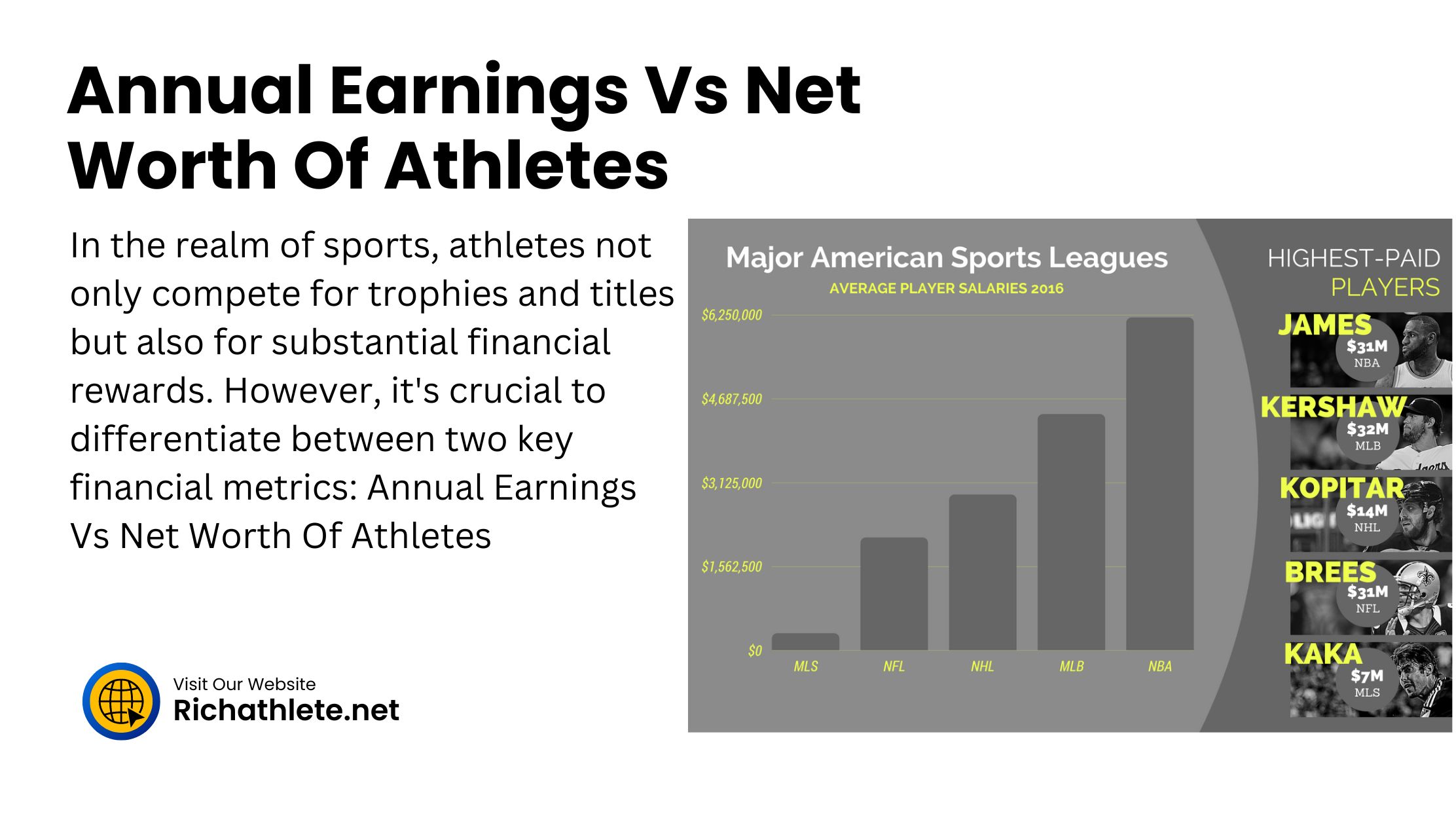Annual Earnings Vs Net Worth Of Athletes
In the realm of sports, athletes not only compete for trophies and titles but also for substantial financial rewards. However, it’s crucial to differentiate between two key financial metrics: Annual Earnings Vs Net Worth Of Athletes. While both are indicative of an athlete’s financial success, they represent distinct aspects of their financial standing.
Understanding Annual Earnings
Annual earnings refer to the total income an athlete earns within a fiscal year. This includes salaries from contracts, prize money, performance bonuses, and endorsement deals. The annual earnings of athletes can vary significantly based on their performance, popularity, and marketability.
Some athletes, such as Cristiano Ronaldo and LeBron James, command astronomical salaries and endorsement deals, leading to staggering annual earnings that often surpass those of CEOs of Fortune 500 companies. These earnings are a testament to their talent, marketability, and global appeal.
Exploring Net Worth
On the other hand, net worth encompasses the total assets an athlete owns minus their liabilities. This includes investments, real estate, business ventures, and personal property. Net worth provides a holistic view of an athlete’s financial health beyond their yearly income.
Factors such as smart investments, prudent financial management, and lucrative endorsement deals contribute to an athlete’s net worth. However, it’s essential to note that extravagant spending, poor financial decisions, and legal issues can deplete net worth rapidly.
Comparison of Annual Earnings and Net Worth
While annual earnings showcase an athlete’s earning potential within a specific timeframe, net worth reflects their overall financial standing. Annual earnings are more fluid and subject to fluctuations, whereas net worth provides a more stable indicator of wealth accumulation over time.
Athletes with high annual earnings but low net worth may struggle with financial stability in the long run if they fail to invest wisely or manage their finances responsibly. Conversely, athletes with modest annual earnings but substantial net worth may have secured their financial future through prudent investment and savings strategies.
Case Studies
Consider the case of two athletes with contrasting financial profiles. Athlete A earns millions of dollars annually from endorsements and contracts but splurges on lavish lifestyles and fails to invest wisely, resulting in a relatively low net worth. Meanwhile, Athlete B earns a moderate income but prioritizes savings, investments, and financial planning, leading to a substantial net worth despite lower annual earnings.
Factors Influencing Annual Earnings
An athlete’s annual earnings are influenced by various factors, including their performance on the field or court, the duration and terms of their contracts, endorsement deals, and their marketability to sponsors and advertisers.
Factors Influencing Net Worth
Net worth is shaped by factors such as investment decisions, lifestyle choices, tax management, and financial planning. Athletes who diversify their income streams, minimize debt, and invest in appreciating assets tend to accumulate higher net worth over time.
Impact on Career and Retirement
Annual earnings and net worth play pivotal roles in an athlete’s career trajectory and retirement planning. High annual earnings provide financial security during active playing years, while a substantial net worth ensures a comfortable retirement and long-term financial stability.
Challenges and Risks
However, relying solely on annual earnings without building a robust net worth can pose significant risks, including financial instability after retirement, bankruptcy, and dependency on external sources for income. Likewise, mismanaging net worth through reckless spending or risky investments can erode wealth and jeopardize financial security.
Read More: Unlocking The Athlete Net Worth By Sport
Strategies for Financial Success
To achieve financial success, athletes should adopt strategies such as diversifying income streams, seeking professional financial advice, practicing disciplined spending habits, and prioritizing long-term wealth accumulation over short-term gratification.
The Role of Endorsements
Endorsements play a crucial role in augmenting an athlete’s income and boosting their net worth. By partnering with brands and companies, athletes can leverage their fame and influence to secure lucrative endorsement deals, thereby supplementing their earnings and enhancing their financial standing.
Public Perception and Media Coverage
Public perception of athletes often revolves around their annual earnings and net worth, with wealthy athletes facing scrutiny and criticism for their spending habits and lifestyle choices. Media coverage of athletes’ finances can shape public opinion and influence sponsorship opportunities and endorsement deals.
Ethical Considerations
The widening wealth gap in sports raises ethical questions about income disparity, wealth distribution, and the social responsibility of financially successful athletes. Athletes are increasingly expected to use their wealth and influence for philanthropic endeavors and social causes, thereby addressing societal inequalities and contributing to positive change.
Future Trends
Looking ahead, the landscape of athletes’ earnings and net worth is likely to evolve with changes in the sports industry, advancements in technology, and shifts in consumer behavior. Athletes who adapt to these trends, embrace financial literacy, and prioritize long-term financial planning are poised to thrive in an ever-changing economic environment.
Conclusion
In conclusion, understanding the distinction between annual earnings and net worth is essential for athletes to achieve financial success and long-term prosperity. While annual earnings reflect short-term income, net worth encompasses broader financial assets and liabilities, shaping an athlete’s financial legacy beyond their playing years.
Unique FAQs
Q: Are annual earnings more important than net worth for athletes?
-
- A: Both annual earnings and net worth are crucial for an athlete’s financial health. While annual earnings provide immediate income, net worth reflects long-term financial stability and security.
Q: Can an athlete’s net worth decline despite high annual earnings?
-
- A: Yes, an athlete’s net worth can decline due to poor financial management, extravagant spending, legal issues, or investment losses, regardless of their annual earnings.
Q: How can athletes protect and grow their net worth?
-
- A: Athletes can protect and grow their net worth by diversifying investments, practicing disciplined spending, seeking professional financial advice, and prioritizing long-term financial planning.
Q: Do all athletes earn high annual salaries and endorsements?
-
- A: No, the earning potential of athletes varies widely based on factors such as their sport, performance, marketability, and popularity among fans and sponsors.
Q: What role do endorsements play in an athlete’s financial portfolio?
-
- A: Endorsements can significantly augment an athlete’s income, contribute to their net worth, and enhance their financial stability by providing additional revenue streams beyond salaries and prize money.

